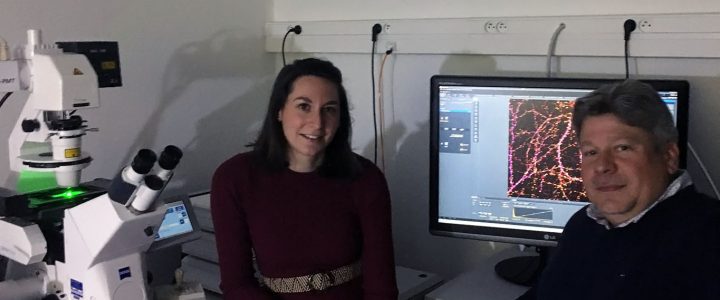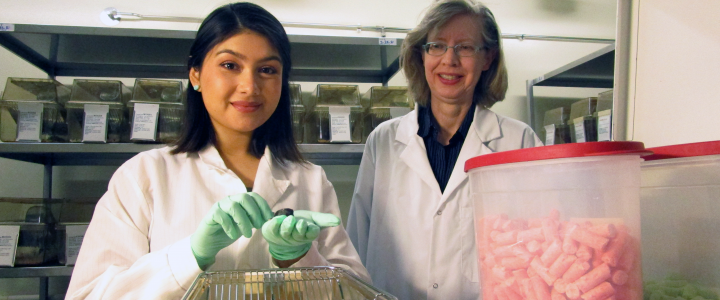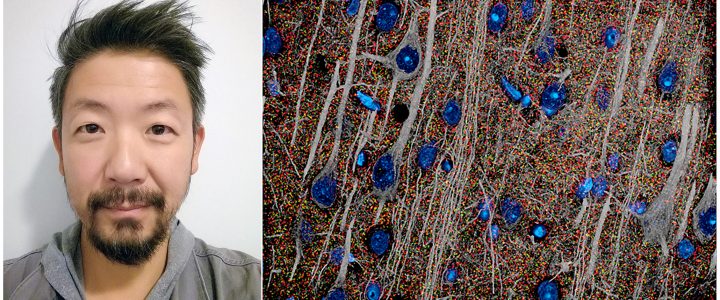One of the lesser known signs of Fragile X is unsteady walking. This is also very easy to evaluate in the clinic: no blood tests are required! With a $100,000 grant from FRAXA Research Foundation, this team will develop objective new outcome measures of gait for future treatment trials and also to see if exercise could improve other symptoms of Fragile X.
Read moreCurrent Research Grants
Versatile Drug Screening Platform for Fragile X Syndrome

Many experts believe that combinations of drugs may be needed to best treat Fragile X syndrome. How can we find the best combinations in the ideal doses? This project — a collaboration between a top university research team and an innovative AI startup both based in Belgium — tackles this challenge.
Read moreFunctional and Genomic Characterization of Interneurons in the Fmr1-KO Mouse Brain

The brain’s balance is maintained by two types of neurons: those that excite and those that inhibit activity. Like yin and yang, this balance is essential. This team has found fewer than normal inhibitory cells in the brains of Fragile X mice. They are now working to pinpoint this abnormality and find ways to restore the normal balance and function.
Read moreRepurposing FDA-Approved Drugs to Treat Major Depressive Disorder in Fragile X Syndrome

Did you know that depression is more common in those with autism and/or Fragile X? Even more disturbing is the discovery that current treatments for depression do not work in Fragile X mice. With this grant, the team will work to develop a rapid screening tool to identify FDA-approved drugs which can treat depression in people with Fragile X syndrome.
Read moremRNA Therapy for Fragile X Syndrome

Dr. Kathryn Whitehead, Associate Professor at Carnegie Mellon University, helped develop the revolutionary science behind the COVID-19 vaccines. With a $103,000 grant from FRAXA, her team will now adapt this technology to deliver the missing Fragile X protein, to treat people who have Fragile X syndrome.
Read moreCharacterization of a Novel CYFIP1 – Derived Peptidomimetic Restoring the Dysregulated mRNAs Translation: Toward An Innovative Therapeutic Strategy for FXS

The researchers are developing next-generation drugs called peptidomimetics, using the functional features of FMRP. If they succeed, the hope is that we will have new drugs that could make up for the loss of FMRP, thus treating Fragile X syndrome.
Read moreCannabinoids as a Treatment for Fragile X Syndrome

Many people with Fragile X syndrome are hyper-sensitive to sights and sounds, and Electroencephalography (EEG) studies show that there are abnormalities in brain circuits. EEG studies show similar changes in Fragile X mice. So the team will use EEG tests in mice to find which drugs best reduce hypersensitivity. They can then easily move on to human EEG-based clinical trials. What they learn will tell us much more about why people with Fragile X are hypersensitive – and which drugs could best help them.
Read moreInhibiting Nonsense – Mediated mRNA Decay: A Potential Treatment Approach for Fragile X

All cells have a kind of housecleaning service which sweeps away genetic errors. This is called nonsense-mediated mRNA decay (NMD). With a previous FRAXA grant, this team discovered runaway NMD in cells of Fragile X patients. It’s not yet known how this impacts people with Fragile X. With this grant, Dr. Maquat and Dr. Kurosaki will test drugs which can bring NMD back to normal levels.
Read moreExploring Drug Repurposing to Restore Hippocampal Function in FXS Mouse Models

A gene’s job is to produce a protein. In Fragile X syndrome, the FMR1 gene is mutated and cannot make FMRP, a protein which shapes connections between nerve cells (neurons) in the brain. These connections are the basis of learning and memory. This team has discovered a mechanism involving FMRP that is absolutely essential to control the connections between neurons. These connections are the basis of learning and memory. They will now test available drugs which directly target this mechanism, to see if they can treat Fragile X syndrome.
Read moreContribution of Microglia to the Therapeutic Effects of Metformin and Adiponectin in Fragile X Syndrome

The research team of Brian Christie, PhD and Marie-Eve Tremblay is developing ways to balance hormones, including drugs like metformin and changes in diet, which could not only reduce hunger and obesity, but ultimately also improve learning and behavior in Fragile X syndrome.
Read moreCharacterization of Microglia Transcriptional Profile in Fmr1 Knockout Mice Model

With this grant, the team will identify the pathways responsible for this excessive activation and attempt to reverse the excess. If they can correct this using drugs, they will be able to identify a new potential treatment for Fragile X syndrome solving one more piece of the Fragile X brain puzzle.
Read moreIdentifying Cellular and Molecular Signatures in Human Neurons That Distinguish Fragile X Syndrome Patients with Divergent EEG Profiles

Why is it so hard to find the right medications to help people with Fragile X syndrome? Just as Fragile X affects individuals differently, medications do as well. This project aims to bring personalized medicine to Fragile X syndrome.
Read morePreclinical Testing of High Fat/Low Carb Diets in Fragile X Mice and Cells

With a $90,000 research grant from FRAXA, Dr. Cara Westmark’s team will use mice to determine if more palatable Atkins-type diets can improve sleep and boost learning skills for those with Fragile X syndrome.
Read moreFRAXA Drug Validation Initiative (FRAXA-DVI)

The FRAXA Drug Validation Initiative (FRAXA-DVI) provides speedy, cost-effective, objective preclinical testing of potential Fragile X treatments. FRAXA-DVI uses in-vitro systems, behavior batteries, and gene expression and peripheral biomarker platforms to validate investigational new drugs and repurposed available compounds in Fragile X syndrome (FXS).
Read moreScreening Combinatorial Pharmacological Therapies for Fragile X Syndrome

FRAXA Research Foundation has awarded a $90,000 research grant to Stanford University principal investigators Dr. Philippe Jacques Mourrain and Dr. Gordon Wang, along with postdoctoral fellow, Dr. Rochelle Coulson. They are evaluating additive effects of combinatorial drug treatments to correct a broad spectrum of deficits observed in Fragile X syndrome.
Read more
